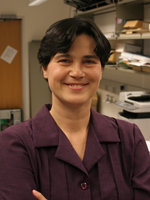Go to
Tajana Šimunić Rosing
 Associate Professor
Associate Professor
Department of Computer Science and Engineering
University of California, San Diego, CA - USA
Webpage
Variability in Datacenters
There are many sources of variability in datacenters; some examples include environmental, vendor and aging. We use in-situ sensing of relevant parameters, coupled with VM level scheduling to ensure that the systems operate effectively in spite of variability. Specifically, in this talk we show how we can use proactive thermal management policies to reduce the environmental variability at little to no cost at the application level. The experimental results using real datacenter workloads show that our proactive technique is able to dramatically reduce the adverse effects of temperature, and thus mitigate the aging variability, by over 60%. We coupled thermal with cooling management, and showed further reductions in variations, and reduced cooling costs by up to 80%. Lastly, we present how we can integrate SLA management capabilities along with symbiotic workload scheduling to enable 2x or higher increases in energy efficiency while meeting the SLA requirements and leveraging heterogeneous HW capabilities.
About the speaker:
Tajana Šimunić Rosing is currently an Associate Professor in Computer Science Department at UCSD. Her research interests are energy efficient computing, embedded and wireless systems. Tajana’s work on event driven dynamic power management laid the mathematical foundations for the engineering problem, devised a globally optimal solution and more importantly defined the framework for future researchers to approach these kinds of problems in embedded system design. Her recent results demonstrate the importance of joint power and thermal management in multicore server systems in order to minimize the overall energy cost. Furthermore, she developed a novel class of proactive thermal management policies that can lower the incidence of hot spots in multicore processors by up to 60% with no performance impact. Her current work is focused on developing energy efficient scheduling policies for virtualized server environments and on energy efficiency in population area healthcare networks.
From 1998 until 2005 she was a full time research scientist at HP Labs while also leading research efforts at Stanford University. She finished her PhD in EE in 2001 at Stanford, concurrently with finishing her Masters in Engineering Management. Her PhD topic was dynamic management of power consumption. Prior to pursuing the PhD, she worked as a senior design engineer at Altera Corporation. She obtained the MS in EE from University of Arizona. Her MS thesis topic was high-speed interconnect and driver-receiver circuit design. She has served at a number of Technical Paper Committees, and is currently an Associate Editor of IEEE Transactions on Mobile Computing. In the past she has been an Associate Editor of IEEE Transactions on Circuits and Systems.
Secondary navigation
- EPFL Workshop on Logic Synthesis and Emerging Technologies
- Luca Amaru
- Luca Benini
- Giovanni De Micheli
- Srini Devadas
- Antun Domic
- Rolf Drechsler
- Pierre-Emmanuel Gaillardon
- Jie-Hong Roland Jiang
- Akash Kumar
- Shahar Kvatinsky
- Yusuf Leblebici
- Shin-ichi Minato
- Alan Mishchenko
- Vijaykrishnan Narayanan
- Ian O'Connor
- Andre Inacio Reis
- Martin Roetteler
- Julien Ryckaert
- Mathias Soeken
- Christof Teuscher
- Zhiru Zhang
- Symposium on Emerging Trends in Computing
- Layout synthesis: A golden DA topic
- EPFL Workshop on Logic Synthesis & Verification
- Luca Amaru
- Luca Benini
- Robert Brayton
- Maciej Ciesielski
- Valentina Ciriani
- Jovanka Ciric-Vujkovic
- Jason Cong
- Jordi Cortadella
- Giovanni De Micheli
- Antun Domic
- Rolf Drechsler
- Henri Fraisse
- Paolo Ienne
- Viktor Kuncak
- Enrico Macii
- Igor Markov
- Steven M. Nowick
- Tsutomu Sasao
- Alena Simalatsar
- Leon Stok
- Dirk Stroobandt
- Tiziano Villa
- Symposium on Emerging Trends in Electronics
- Raul Camposano
- Anantha Chandrakasan
- Jo De Boeck
- Gerhard Fettweis
- Steve Furber
- Philippe Magarshack
- Takayasu Sakurai
- Alberto Sangiovanni-Vincentelli
- Ken Shepard
- VENUE
- Panel on Circuits in Emerging Nanotechnologies
- Panel on Emerging Methods of Computing
- Panel on The Role of Universities in the Emerging ICT World
- Panel on Design Challenges Ahead
- Panel on Alternative Use of Silicon
- Nano-Bio Technologies for Lab-on-Chip
- Functionality-Enhanced Devices Workshop
- More Moore: Designing Ultra-Complex System-on-Chips
- Design Technologies for a New Era
- Nanotechnology for Health
- Secure Systems Design
- Surface Treatments and Biochip Sensors
- Security/Privacy of IMDs
- Nanosystem Design and Variability
- Past Events Archive
Registration
Registration is free of charge. Please send an e-mail with subject line "Nanosystem Design and Variability" to anil.leblebici@epfl.ch to register. Make sure to state your full name and affiliation.
